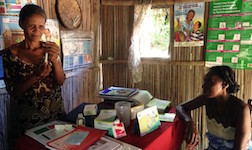WDI Working To Improve Healthcare Access In Madagascar
Thursday, December 8, 2016
WDI researchers from the Healthcare Initiative are set to begin the second year of a project aimed at improving the supply chain and cost recovery systems for essential medicines and health commodities in Madagascar.

The work in Madagascar is one of four projects WDI is performing for Abt Associates as part of the Sustaining Health Outcomes through the Private Sector (SHOPS) Plus project, which is funded by the U.S. Agency for International Development (USAID). WDI was tasked with studying the cost recovery system in Madagascar and finding potential design improvements.
On the island nation off the southeast coast of Africa, the procurement, storage, distribution, and quality assurance of essential medicines and other health products is handled by the central medical store, a non-profit association known as SALAMA. When those drugs and health commodities are supplied by the public sector, a government mechanism called Non-Stop Financing for Medication Supply (in French, FANOME) recovers some logistical and administrative costs.
Cost recovery mechanisms in public health supply chains, such as FANOME, support the principles embodied in the Bamako Initiative. This initiative, adopted in 1987 by African health ministers, is based on the concept that communities should participate directly in the management and funding of essential medicines and health commodities.
These mechanisms are meant to provide a stable source of financing, ensuring a regular supply of essential health products and, ultimately, a self-sustaining system. However, these cost recovery mechanisms sometimes struggle to serve their original purpose.
“We are doing this work while also recognizing that the world has changed since the Bamako Initiative was adopted,” said Steven Harsono, a senior advisor with WDI’s Healthcare Initiative. “Household incomes are rising, the private sector for health products is becoming more formalized, and new health products are being introduced by donor-funded initiatives. Ultimately, we hope that our work will make a modest contribution to equipping the entire health system in Madagascar as it addresses these changing realities.”
While only about 15 percent of total pharmaceutical revenues in Madagascar pass through SALAMA and use FANOME, the two still play an important role in achieving positive public health objectives in the country.
Harsono and Ben Davis, a senior research associate with the healthcare initiative, traveled to Madagascar, and spoke with key government and private sector stakeholders, as well as donors and implementing partners. As Harsono and Davis discovered, FANOME is underperforming due to a number of challenges, including the fact that it must be implemented and regulated in 112 districts and approximately 2,700 government-owned service delivery points.
Still, the greatest challenge lies in its management structure. Multiple agencies manage each of the three levels of FANOME, but no single agency has the full authority or visibility to manage its overall performance. As responsibility for FANOME is dispersed across health system actors and levels, so too is the data that could be used to monitor its proper function.
Armed with this information and feedback gathered through the interviews, the WDI researchers developed concrete recommendations for increasing the sustainability of FANOME and improving its performance.
Among their recommendations for future areas of work are to develop and advance a framework for action-oriented performance management of FANOME. This recommendation is meant to result in a clear method for linking key performance metrics to decision-making within the complex roles and responsibilities structure of FANOME.
Another recommendation of WDI is to conduct a deeper examination of district-level wholesale pharmacies – known as PhaGDis in Madagascar – to explore the factors that contribute to their underperformance. PhaGDis play a critical role in FANOME by linking SALAMA to primary health clinics in each district.
Harsono and Davis will work with country stakeholders to develop a pilot project for addressing PhaGDis underperformance. Following the launch of a pilot, the FANOME performance management framework would be used to monitor pilot efficacy.
“Our work in Madagascar highlights the inherent challenges with implementing the Bamako Initiative vision,” Harsono said. “Empowering local communities and households to financially contribute to quality health products and services requires strong governance and management systems to be in place. Through this project, we are working alongside the Government of Madagascar to improve access with business-minded approaches.”
As part of the SHOPs project, WDI also is examining pharmaceutical supply chains in Senegal, studying pregnancy test kits as part of family planning in five countries, contributing to the design of a challenge fund and learning initiative for innovative health enterprises in India, and contributing to an ecosystem mapping project in Senegal to determine whether challenge funds are an appropriate funding mechanism for health enterprises in the country.
Photo by Colin Gilmartin (Management Sciences for Health)
